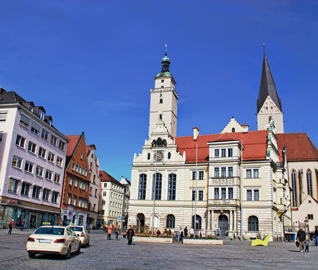In Germany, the local public transport operator (INVG) in the Upper Bavarian town of Ingolstadt, the town’s football club FC Ingolstadt 04 and the Regional Police Department for Upper Bavaria North (Oberbayern Nord) have joined forces in a user community, to share a video system installed by Dallmeier and its IT subsidiary IPPI.
A video solution that satisfied German data privacy law is using Dallmeier Panomera product. The patented Panomera multifocal sensor technology (MFS) offers coverage of large expanses, the German manufacturer says, and is the firm says particularly of use in public places (pictured; Ingolstadt’s main square) and traffic. Using Panomera, it is possible to cover huge widths, as well as areas with large distances in real time and at high frame rates of up to 30 fps (frames per second), according to the firm. The company adds that it has been possible to reduce project costs. For example, 35 standard megapixel cameras – including the associated technical infrastructure – were replaced by one Panomera, with eight sensors.
Data is transmitted across the Metro-Net from COM-IN Telekommunikations GmbH. For example, the public transport operator only has access to low resolution overview images from the cameras, which have been installed to cover the local public travel network, such as the main bus station. The rights of use of stadium security are likewise restricted, and this organisation only has access to cameras in and around the Audi Sportpark stadium. To help them carry out their duties the police are authorised to access all cameras and can observe in detail at maximum resolution, and have the option to store recording sequences. The back-up function is used to back up incidents so that they can be investigated with other image material, admissible as evidence, in case of investigations.
At the same time, the user rights do not limit the effectiveness of the system as a whole, says Dallmeier: the police, INVG and the football club speak regularly, and if crimes are committed in the areas under surveillance, the analysis of the recorded material is carried out in compliance with data protection regulations by the police.










